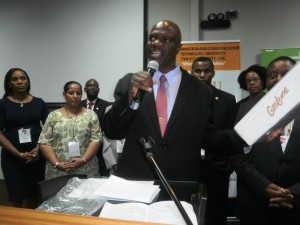By Walter Wilson Nana In Harare, Zimbabwe
Update Feb 25, 2013
Stakeholders in the Information & Communication Technology, ICT, revolution across the African continent have been told ICT is at the epicentre of the continent’s growth and development.
At the opening ceremony of the International Conference on ICT for Africa 2013 in the Cresta Lodge, Harare, Zimbabwe’s Deputy Prime Minister, Prof. Arthur Mutambara mentioned that the ICT revolution is a game changer, adding that things cannot be same again in Africa. “ICT affects every sector of our life. Africa must be competitive in all its facets of life and how we can use ICT to drive Africa’s competiveness, attract investors via ICT, develop it, customise it and stop being consumers of ICT,” the government executive officer said.
According to Mutambara, Africa must be participants in the construction and not observers in the process of ICT, especially ICT that is relevant to us.
He told the delegates that came from South Africa, Zimbabwe, Uganda, Cameroon, Mali, Ghana, Malawi, Nigeria, Kenya, Zambia and the USA that Africans should use the ICT to close the gap between the poor and the rich, the north and the south, making it the tool that turns the education, banking, agriculture, the economy and more. “We can’t fight technology, we’ve to catch-up,” he advised.
Mutambara called for a change of mentality in all that is done across Africa, citing reasons why certain laws have to be revised, so as to be on the edge of new technology, which is now revolutionalising the world. “How are we going to be in 10 years vis-a-vis the ICT? Let’s use it to drive agriculture, move up the value chain by leveraging ICT, science and technology,” he noted.

Dr Heidi Williams (2nd from right) from the USA presents an award to Zimbabwe's Minister of ICT, Nelson Chamisa ..
He challenged ICT practitioners, academics, students, government officials, members of the industrial sector to make the lessons from the south to the north, saying the mental poverty in the south should be the unique opportunity to highlight the hindsight that is not known of Africa.
Mutambara cautioned that the conference should not end up in another talk shop, but entreated participants to take their responsibilities and work in synergy for a defined timeline. “Africans must work together and develop their countries, with the use of data being at the fore in all we do thanks to the ICT revolution.”
The Minister of ICT in Zimbabwe, Nelson Chamisa said Africa should no longer be importing computers, “we should make them. We should consolidate and strategies on more ideas,” he added.
Chamisa invited government across Africa to move very fast on the ICT developments as they do in other sectors.
The Director of the International Centre for Information Technology & Development, ICITD, USA and President, ICT University, Yaoundé, Cameroon, Prof. Victor Mbarika talked about the need for more PhDs to be trained in the ICT revolution.
Prof. Gabriel Kabanda of the host university, the National University of Science & Technology, Zimbabwe, found the conference to be an enrichment exercise that goes beyond the classroom to the society and the industrial sector.
He enjoined African researchers to pursue dialogue on the ICT affairs.
Earlier, the chair of the Local Organising Committee, Prof. Yati Naik joined his voice to the view that it is up for Africans to provide their own ICT solutions.
Keynote Address
In his discourse, Prof. Sammy Beban Chumbow, Vice Chancellor of the ICT University in Yaoundé said today’s world is in the ICT era, which is another stop that Africa cannot afford to miss out after the Agrarian and Industrial Revolutions respectively. “Therefore, Africa must catch up with the knowledge economy, which is knowledge production, knowledge management, knowledge dissemination and knowledge appropriation.”
According to Prof. Chumbow, African countries have the obligation to create knowledge economy, which has in focus national development. “The context of development must have at it centre language and communication. These are crucial since knowledge is power and a sine qua condition for national development,” he said.
The varsity don posited that communication is important to get people aware in the process of a new idea and appropriation of knowledge. He found in knowledge and communication the ingredients of development, saying ICT must know development communication.
The erudite Professor cited participative development and some graphic examples to demonstrate how they are part of the component of development communication.
Other speakers in the conference presented papers in the areas of; ICT & Development, ICT in Education & E-learning, ICT, Development & Poverty Reduction, ICT, Media & Journalism, Innovation, Open-source & Software Development and ICT in Healthcare.
The ICT for Africa conference is an annual initiative that brings together stakeholders of the educational and industrial sectors in Africa, with the aim of reflecting on how to transfer, diffuse and adopt the ICTs within the African context.
From Harare, 2013, the ICT for Africa caravan moves to Nairobi, Kenya in 2014.








